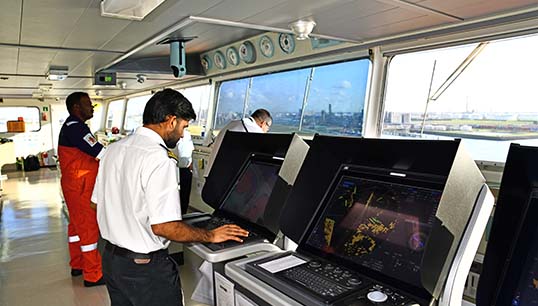- Topics
- Campaigning
- Careers
- Colleges
- Community
- Education and training
- Environment
- Equality
- Federation
- General secretary message
- Government
- Health and safety
- History
- Industrial
- International
- Law
- Members at work
- Nautilus news
- Nautilus partnerships
- Netherlands
- Open days
- Opinion
- Organising
- Podcasts from Nautilus
- Sponsored content
- Switzerland
- Technology
- Ukraine
- United Kingdom
- Welfare

Director of legal services Charles Boyle, a recognised expert in the Maritime Labour Convention, explains proposed amendments to the document
The Maritime Labour Convention, 2006 (MLC) – often referred to as the 'Seafarers' Bill of Rights' – covers many aspects of working and living conditions onboard, such as: wages, hours of work and rest, paid annual leave, repatriation, crewing levels, accommodation, food, medical care, welfare, training, and recruitment and placement. Currently ratified by 98 states representing over 91 per cent of global shipping, it lays down the basic rights that seafarers are entitled to.
Amendments
Unfortunately, the Covid-19 pandemic has seen some actors disregarding their obligations under the MLC – ranging from governments denying the shore leave and transit they are legally bound to facilitate, to shipowners failing to properly repatriate seafarers. There have even been cases of shipowners trying to change the repatriation destination in seafarers' employment agreements (SEAs), to avoid bearing costs arising from hotel quarantine.

As a living document, the Convention itself aspires to continuous improvement. For an international instrument it contains a relatively straightforward amendment procedure, so that it can be updated to ensure that it is still providing effective protection for seafarers and is kept up to date with developments within the industry.
The next meeting of the Special Tripartite Committee (STC) – consisting of representatives for seafarers, shipowners and government – will take place in May 2022. The Seafarers Group is currently chaired by Nautilus International general secretary Mark Dickinson, and has put forward the following amendments for consideration by the Committee:
- Recruitment and placement services to issue adequate information to seafarers about their system of protection to cover shipowner liabilities, including details of how to make a claim
- Where the shipowner is not the employer of the seafarer, the provision of a contractual indemnity to the seafarer through the SEA, against monetary loss arising from the employer's failure to meet its obligations, so making the shipowner liable in contract law (not just flag state statutory laws)
- Shipowners to repatriate seafarers to their home address or other agreed address (not just to a national airport) and to be responsible for: pay, allowances, food, and accommodation until repatriated; necessary medical treatment until the seafarers are medically fit to travel
- The MLC financial security provision be increased to cover eight months' wages (currently it covers four months' wages)
- A requirement that food be 'healthy' and that inspections ensure that it is of adequate quantity and nutritional value; that potable water should be provided 'free of charge'
- Seafarers to be issued with all necessary 'appropriately fitting' Personal Protective Equipment (PPE)
- Seafarers to be provided with access to ship to shore communications including internet facilities 'free of charge' and port states to ensure provision is made available for free wi-fi for seafarers within its ports and associated anchorages
Together, these amendments will represent a serious step towards improving the wellbeing of seafarers, and tackle some of the deficiencies exposed during the pandemic – as well as longstanding issues like abandonment and poor access to medical care which have been exacerbated by Covid.
The negotiations
I attended the recent 'Future Proofing the Maritime Labour Convention' event held by Seafarers' Rights International (SRI) during London International Shipping Week. I also represented Nautilus at the International Labour Organization's second global forum on the MLC. At both events, government and shipowners said that they were committed to maintain and strengthen protection for seafarers.
Governments have also put forward their own amendments – one on mandatory reporting of seafarer fatalities at sea, the other clarifying the maximum duration of service periods on board.
At the upcoming negotiations in May, we will see how far this goodwill extends.
Nautilus is looking forward to what will prove to be a very challenging meeting of the STC. This is the most extensive list of potential amendments put forward to date. Not only will the substance of the proposals be debated but, even when agreed, the drafting of the changes will need to be meticulous, so that they fit well within the Convention without creating ambiguity or contradictions.
However, Nautilus is optimistic about the prospect of a positive outcome, and we will be pushing hard for changes to remedy the Convention's shortcomings, which have been exposed by the pandemic.
Read the full list of proposed amendments to the Maritime Labour Convention on the International Labour Organization's website.
Tags
More articles
Legal update: Charles Boyle
The blame game: what the CMA CGM Libra case means for seafarers
Paid annual leave for part-time seafarers – how a new ruling affects members
UK issues reminder of MLC rights of seafarers impacted by Russia-Ukraine war
The UK's Maritime and Coastguard Agency (MCA) has issued guidance for shipowners, masters, and manning agents reminding them of the rights of seafarers who may be affected by Russia's invasion of Ukraine.
